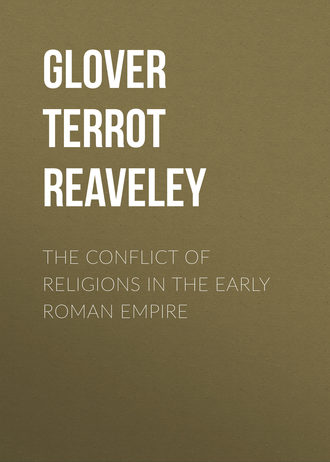 полная версия
полная версияThe Conflict of Religions in the Early Roman Empire
This was to deal with the distinctive usages of Judaism on general principles and from a standpoint outside it. It would doubtless be convincing enough to men who did not need to be convinced, but of little weight with those to whom the Scriptures meant everything. Accordingly the Apologists went to the Scriptures and arrayed their evidence with spirit and system.
We may begin, as the writer to Diognetus begins, with sacrifices. Here the Apologists could appeal to the Prophets, who had spoken of sacrifice in no sparing terms. Tertullian's fifth chapter in his book Against the Jews presents the evidence shortly and clearly. I will give the passages cited in a tabular form: —
Malachi 1, 10: I will not receive sacrifice from your hands, since from the rising sun to the setting my name is glorified among the Gentiles, saith the Lord Almighty, and in every place they offer pure sacrifices to my name.
Psalm 96, 7: Offer to God glory and honour, offer to God the sacrifices of his name; away with victims (tollite) and enter into his court.
Psalm 51, 17: A heart contrite and humbled is a sacrifice for God.
Psalm 50, 14: Sacrifice to God the sacrifice of praise and render thy vows to the Most High.
Isaiah 1, 11: Wherefore to me the multitude of your sacrifices? … Whole burnt offerings and your sacrifices and the fat of goats and the blood of bulls I will not … Who has sought these from your hands?
Justin has other passages as decisive. Does not God say by Amos (5, 21) "I hate, I loathe your feasts, and I will not smell [your offerings] in your assemblies. When ye offer me your whole burnt offerings and your sacrifices, I will not receive them," and so forth, in a long passage quoted at length. And again
Jeremiah 7, 21-22: Gather your flesh and your sacrifices and eat, for neither concerning sacrifices nor drink offerings did I command your fathers in the day that I took them by the hand to lead them out of Egypt.[532]
Next as to circumcision and the Sabbath. "You need a second circumcision," says Justin, "and yet you glory in the flesh; the new law bids you keep a perpetual Sabbath, while you idle for one day and suppose you are pious in so doing; you do not understand why it was enjoined upon you. And, if you eat unleavened bread, you say you have fulfilled the will of God."[533] Even by Moses, who gave the law, God cried "You shall circumcise the hardness of your hearts and stiffen your necks no more";[534] and Jeremiah long afterwards said the same more than once.[535] On the Sabbath question, Tertullian and the others distinguished two Sabbaths, an eternal and a temporal,[536] citing: —
Isaiah 1, 14: My soul hates your sabbaths.
Ezekiel 22, 8: Ye have profaned my sabbath.
The Jew is referred back to the righteous men of early days – Was Adam circumcised, or did he keep the Sabbath? or Abel, or Noah, or Enoch, or Melchizedek? Did Abraham keep the Sabbath, or any of the patriarchs down to Moses?[537] "But," rejoins the Jew, "was not Abraham circumcised? Would not the son of Moses have been strangled, had not his mother circumcised him?"[538]
Old law or new covenant
To this the Christian had several replies. Circumcision was merely given for a sign, as is shown by the fact that a woman cannot receive it, "for God has made women as well able as men to do what is just and right." There is no righteousness in being of one sex rather than of the other.[539] Circumcision then was imposed upon the Jews "to mark you off from the rest of the nations and from us, that you alone might suffer what now you are suffering, and so deservedly suffering – that your lands should be desolate and your cities burnt with fire, that strangers should eat your fruits before your faces, and none of you set his foot in Jerusalem. For in nothing are you known from other men apart from the circumcision of your flesh. None of you, I suppose, will venture to say that God did not foresee what should come to pass. And it is all deserved; for you slew the Righteous one and his prophets before him; and now you reject and dishonour – so far as you can – those who set their hopes on him and on the Almighty God, maker of all things, who sent him; and in your synagogues you curse those who believe on Christ."[540] The Sabbath was given to remind the Jews of God; and restrictions were laid on certain foods because of the Jewish proclivity to forsake the knowledge of God.[541] In general, all these commands were called for by the sins of Israel,[542] they were signs of judgment.
On the other hand the so-called Barnabas maintains that the Jews never had understood their law at all. Fasts, feasts and sacrifices were prescribed, not literally, but in a spiritual sense which the Jews had missed. The taboos on meats were not prohibitions of the flesh of weasels, hares and hyænas and so forth, but were allegoric warnings against fleshly lusts, to which ancient zoologists and modern Arabs have supposed these animals to be prone.[543] Circumcision was meant, as the prophets showed, to be that of the heart; evil dæmons had misled the Jews into practising it upon the flesh.[544] The whole Jewish dispensation was a riddle, and of no value, unless it is understood as signifying Christianity.
This line of attack was open to the criticism that it robbed the religious history of Israel of all value whatever, and the stronger Apologists do not take it. They will allow the Jews to have been so far right in observing their law, but they insist that it had a higher sense also, which had been overlooked except by the great prophets. The law was a series of types and shadows, precious till the substance came, which the shadows foretold. That they were mere shadows is shown by the fact that Enoch walked with God and Abraham was the friend of God. For this could not have been, if the Jewish contention were true that without Sabbath and circumcision man cannot please God. Otherwise, either the God of Enoch was not the God of Moses – which was absurd; or else God had changed his mind as to right and wrong – which was equally absurd.[545] No, the legislation of Moses was for a people and for a time; it was not for mankind and eternity. It was a prophecy of a new legislator, who should repeal the carnal code and enact one that should be spiritual, final and eternal.[546] Here, following the writer to the Hebrews, the Apologists quote a great passage of Jeremiah, with the advantage (not always possible) of using it in the true sense in which it was written. "Behold! the days come, saith the Lord, when I will make a new covenant with the house of Israel and with the house of Judah; not that which I made with their fathers in the day when I took them by the hand to lead them out of Egypt; which my covenant they brake, although I was an husband unto them, saith the Lord. But this shall be the covenant that I will make with the house of Israel: After those days, saith the Lord, I will put my law in their inward parts and write it in their hearts, and I will be their God and they shall be my people."[547]
With the law, the privilege of Israel passes away and the day of the Gentiles comes. It was foretold that Israel would not accept Christ – "their ears they have closed";[548] "they have not known nor understood";[549] "who is blind but my servants?"[550] "all these words shall be unto you as words of a book that is sealed."[551] "By Isaiah the prophet, God, knowing beforehand what you would do, cursed you thus";[552] and Justin cites Isaiah 3, 9-15, and 5, 18-25. Leah is the type of the synagogue and of the Jewish people and Rachel of "our church"; the eyes of Leah were weak, and so are the eyes of your soul – very weak.[553] No less was it prophesied that the Gentiles should believe on Christ – "in thee shall all tribes of the earth be blest"; "Behold! I have manifested him as a witness to the nations, a prince and a ruler to the races. Races which knew thee not shall call upon thee and peoples who were ignorant of thee shall take refuge with thee."[554]
"By David He said 'A people I knew not has served me, and hearkened to me with the hearing of the ear.' Let us, the Gentiles gathered together, glorify God," says Justin, "because he has visited us … for he is well pleased with the Gentiles, and receives our sacrifices with more pleasure than yours. What have I to do with circumcision, who have the testimony of God? What need of that baptism to me, baptized with the holy spirit? These things, I think, will persuade even the slow of understanding. For these are not arguments devised by me, nor tricked out by human skill, – nay! this was the theme of David's lyre, this the glad news Isaiah brought, that Zechariah proclaimed and Moses wrote. Do you recognize them, Trypho? They are in your books – no! not yours, but ours – for we believe them – and you, when you read, do not understand the mind that is in them."[555] And with that Justin passes on to discuss whether Jesus is the Messiah. Such a passage raises the question as to how far he is reporting an actual conversation. In his 80th chapter he says to Trypho that he will make a book (syntaxis) of their conversation – of the whole of it – to the best of his ability, faithfully recording all that he concedes to Trypho. Probably he takes Plato's liberty to develop what was said – unless indeed the dialogue is from beginning to end merely a literary form imposed upon a thesis. In that case, it must be owned that Justin manages to give a considerable suggestion of life to Trypho's words.
Jesus the Messiah
But, even if the law be temporary, and the Sabbath spiritual, if Israel is to be rejected and the Gentiles chosen, we are still far from being assured on the warrant of the Old Testament that Jesus is the Messiah, who shall accomplish this great change. Why he rather than any of the "ten thousand others" who might much more plausibly be called the Messiah?[556]
To prove the Messiahship of Jesus, a great system of Old Testament citations was developed, the origins of which are lost to us. Paul certainly applied Scripture to Jesus in a free way of his own, though he is not more fanciful in quotation than his contemporaries. But he never sought to base the Christian faith on a scheme of texts. Lactantius, writing about 300 A.D., implies that Jesus is the author of the system. "He abode forty days with them and interpreted the Scriptures, which up to that time had been obscure and involved."[557] Something of the kind is suggested by Luke (24, 27). But it is obvious that the whole method is quite alien to the mind and style of Jesus, in spite of quotations in the vein of the apologists which the evangelists here and there have attributed to him.
We may discover two great canons in the operations of the Apologists. In the first place, they seek to show that all things prophesied of the Messiah were fulfilled in Jesus of Nazareth; and, secondly, that everything which befel Jesus was prophesied of the Messiah. These canons need only to be stated to show the sheer impossibility of the enterprise to anyone who attaches meaning to words. But in the early centuries of our era there was little disposition with Jew or Greek to do this where those books were concerned, whose age and beauty gave them a peculiar hold upon the mind. In each case the preconception had grown up, as about the myths of Isis, for example, that such books were in some way sacred and inspired. The theory gave men an external authority, but it presented some difficulties; for, both in Homer and in Genesis as in the Egyptian myths, there were stories repugnant to every idea of the divine nature which a philosophic mind could entertain. They were explained away by the allegoric method. Plutarch shows how the grossest features of the Isis legend have subtle and spiritual meanings and were never meant to be taken literally – that the myths are logoi in fact; and Philo vindicates the Old Testament in the same way.[558] The whole procedure was haphazard and unscientific; it closely resembled the principles used by Artemidorus for the interpretation of dreams – a painful analogy. But, in the absence of any kind of historic sense, it was perhaps the only way in which the continuity of religious thought could then be maintained. It is not surprising in view of the prevalence of allegory that the Christians used it – they could hardly do anything else. Thus with the fatal aid of allegory, the double thesis of the Apologists became easier and easier to maintain.
The most accessible illustration of this line of apology is to be found in the second chapter of Matthew. We may set out in parallel columns the events in the life of Jesus and the prophecies which they fulfil.
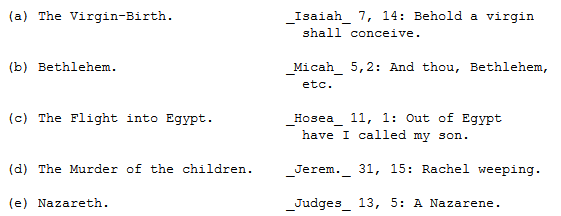
It is hardly unfair to say that the man who cited these passages in these connexions had no idea whatever of their original meaning, even where he quotes them correctly.
Here is a fuller scheme taken from the Apology which Justin addressed to the Emperor Antoninus Pius. (The numbers on the left refer to the chapter in the first Apology.)
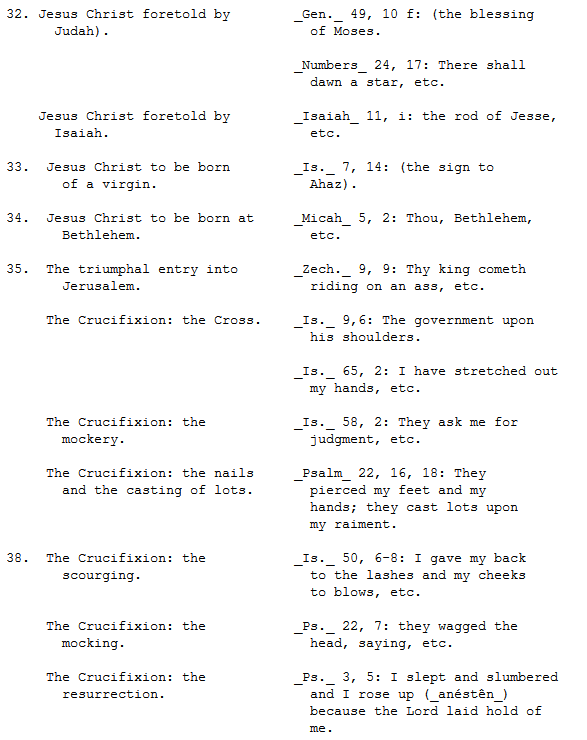
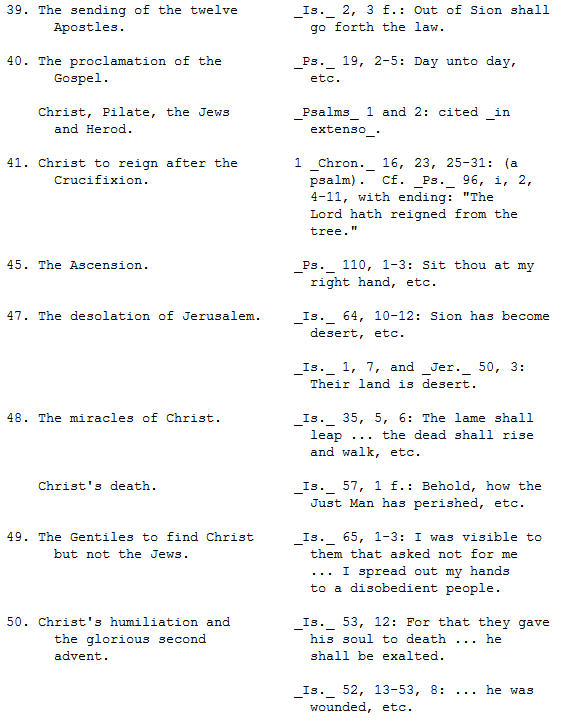
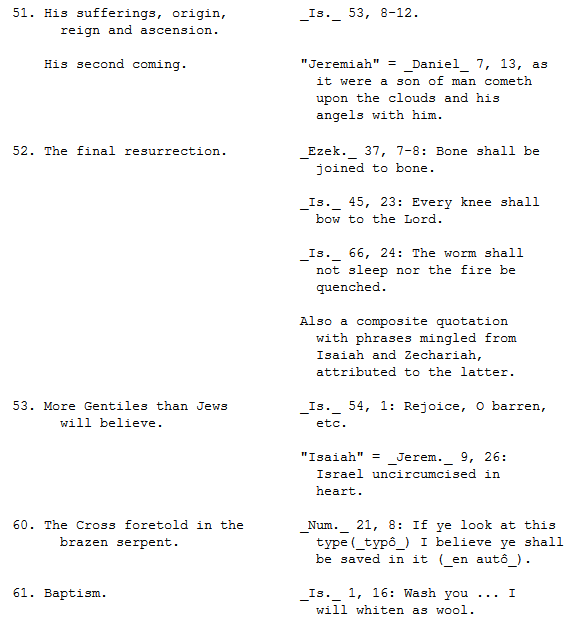
The God beside the Creator
What in the Apology is a bare outline, is developed at great length and with amazing ingenuity in the dialogue with Trypho. We may begin with the question of a "God beside the Creator."
When Moses wrote in Genesis (1, 26) "And God said, 'Let us make man in our image after our likeness,'" and again (3, 22) "And the Lord God said, 'Behold the man is become as one of us,'"[559] why did he use the plural, unless there is a God beside God? Again, when Sodom is destroyed why does the holy text say "The Lord rained upon Sodom and Gomorrha sulphur and fire from the Lord from heaven"?[560] And again in the Psalms (110) what is meant by "The Lord said unto my Lord"?[561] and by "Thy throne, O God, is for ever and ever … therefore God, thy God, hath anointed thee with the oil of gladness above thy fellows?"[562]
The Old Testament abounds in theophanies, which are brought up in turn. Justin cites the three men who appeared to Abraham – "they were angels," says Trypho, and a long argument follows to show from the passage that one of them is not to be explained as an angel,[563] nor of course as the Creator of all things. Trypho owns this. Justin pauses at his suggestion to discuss the meal which Abraham had served, but is soon caught up with the words: "Now, come, show us that this God who appeared to Abraham and is the servant of God, the Maker of all, was born of a virgin, and became, as you said, a man of like passions with all men." But Justin has more evidence to unfold before he reaches that stage. Without following the discussion as it sways from point to point, we may take the passage in which he recapitulates this line of argument. "I think I have said enough, so that, when my God says 'God went up from Abraham,' or 'The Lord spoke to Moses,' or 'The Lord descended to see the tower which the sons of men had built,' or 'The Lord shut the ark of Noah from without,' you will not suppose the unbegotten God Himself went down or went up. For the ineffable Father and Lord of all neither comes anywhere, nor 'walks' [as in the garden of Eden], nor sleeps, nor rises, but abides in his own region wherever it is, seeing keenly and hearing keenly, but not with eyes or ears, but by power unspeakable; and he surveys all things and knows all things, and none of us escapes his notice; nor does he move, nor can space contain him, no, nor the whole universe, him, who was before the universe was made."[564]
The virgin-birth
Who then was it who walked in the garden, who wrestled with Jacob, who appeared in arms to Joshua, who spoke with Moses and with Abraham, who shut Noah into the ark, who was the fourth figure in the fiery furnace? Scripture gives us a key. Can the Jew say, who it is whom Ezekiel calls the "angel of great counsel;" and the "man"; whom Daniel describes "as the Son of man"; whom Isaiah called "child," and David "Christ" and "God adored"; whom Moses called "Joseph" and "Jacob" and "the star"; whom Zechariah called "the daystar"; whom Isaiah again called the "sufferer" (pathêtós), "Jacob" and "Israel"; whom others have named "the Rod," "the Flower," "the Chief Corner-stone" and "the Son of God"?[565] The answer is more clearly given by Solomon in the eighth chapter of Proverbs– it is the Divine Wisdom, to whom all these names apply. When it is said "Let us make man," it is to be understood that the Ineffable communicated his design to his Wisdom, his Logos or Son, and the Son made man. The Son rained upon Sodom the fire and brimstone from the Father. It was the Son who appeared to men in all the many passages cited – the Son, Christ the Lord, God and Son of God – inseparable and unseverable from the Father, His Wisdom and His Word and His Might (dynamis).[566]
But, while all this might be accepted by a Jew, it still seemed to Trypho that it was "paradoxical, and foolish, too," to say that Christ could be God before all the ages, and then tolerate to be born a man, and yet "not a man of men." The offence of the Cross also remained. The Apologist began by explaining the mysteries of the two comings of Christ, first in humiliation, and afterwards in glory, as Jacob prophesied in his last words.[567] For the First Coming Tertullian quotes Isaiah – "he is led as a sheep to the slaughter"; and the Psalms– "made a little lower than the angels," "a worm and not a man"; while the Second Coming is to be read of in Daniel and the forty-fifth Psalm, and in the more awful passage of Zechariah "and then they shall know him whom they pierced."[568] The paschal lamb is a type of the First Coming – especially as it was to be roasted whole and trussed like a cross; and the two goats of Leviticus (16) are types of the two Comings.[569]
"And now," says Justin, "I took up the argument again to show that he was born of a virgin, and that it had been prophesied by Isaiah that he should be born of a virgin; and I again recited the prophecy itself. This is it: 'And the Lord said moreover unto Ahaz, saying: 'Ask for thyself a sign from the Lord thy God in the depth or in the height. And Ahaz said: I will not ask nor tempt the Lord. And Isaiah said: Hear ye then, O house of David! Is it a little thing with you to strive with men? and how will ye strive with the Lord? Therefore shall the Lord himself give you a sign. Behold, the virgin shall conceive and bear a son, and they shall call his name Emmanuel. Butter and honey shall he eat. Before he shall either have knowledge or choose evil, he shall choose good; because, before the child knows evil or good, he refuses evil to choose good. Because, before the child knows to call father or mother, he shall take the power of Damascus and the spoils of Samaria before the King of the Assyrians. And the land shall be taken, which thou shalt bear hardly from before the face of two kings. But God will bring upon thee, and upon thy people, and upon the house of thy father, days which have never come, from the day when Ephraim removed from Judah the King of the Assyrians.' And I added, 'That, in the family of Abraham according to the flesh, none has ever yet been born of a virgin, or spoken of as so born, except our Christ, is manifest to all.'" It may be noted that the passage is not only misquoted, but is a combination of clauses from two distinct chapters.[570] The explanation is perhaps that Justin found it so in a manual of proof-texts and did not consult the original. Similar misquotations in other authors have suggested the same explanation.
"Trypho rejoined: 'The scripture has not: Behold the virgin shall conceive and bear a son; but: Behold the young woman shall conceive and bear a son: and the rest as you said. The whole prophecy was spoken of Hezekiah and was fulfilled of him. In the myths of the Greeks it is said that Perseus was born of Danae, when she was a virgin – after their so-called Zeus had come upon her in the form of gold. You ought to be ashamed to tell the same story as they do. You would do better to say this Jesus was born a man of men, and – if you show from the Scriptures that he is the Christ – say that it was by his lawful and perfect life that he was counted worthy of being chosen as Christ. Don't talk miracles of that kind, or you will be proved to talk folly beyond even that of the Greeks."'[571]
Trypho has the Hebrew text behind him, which says nothing about a virgin, though the Septuagint has the word. The sign given to Ahaz has a close parallel in a prophecy of Muhammad. Before he became known, an old man foretold that a great prophet should come, and on being challenged for a sign he pointed to a boy lying in rugs by the camp-fire – "That boy should see the prophet"; and he did. Isaiah's sign is much the same; a young woman shall conceive and have a son, and before that son is two or three years old, Damascus and Syria will fall before the King of Assyria.
But Justin and the Apologists are not to be diverted. As for Danae, the Devil (diábolos) has there anticipated the fulfilment of God's prophecy, as in many other instances, e. g.: – Dionysus rode an ass, he rose from the dead and ascended to heaven; Herakles is a parody of the verse in Psalm xix – the strong man rejoicing to run a race, a Messianic text; Æsculapius raised the dead; and the cave of Mithras is Daniel's "stone cut without hands from the great mountains." "I do not believe your teachers; they will not admit that the seventy elders of Ptolemy, King of Egypt, translated well, but they try to translate for themselves. And I should like you to know that they have cut many passages out of the versions made by Ptolemy's elders which prove expressly that this man, who was crucified, was prophesied of as God and man, crucified and slain. I know that all your race deny this; so, in discussions of this kind I do not quote those passages, but I have recourse to such as come from what you still acknowledge."[572] The objection to the rendering "young woman" is that it completely nullifies the sign given to Ahaz, for children are born of young women every day – "what would really be a sign and would give confidence to mankind, – to wit, that the firstborn of all creations should take flesh and really be born a child of a virgin womb – that was what he proclaimed beforehand by the prophetic spirit."[573]
The whole story is parable. It would be absurd to suppose that an infant could be a warrior and reduce great states. The spoils are really the gifts of the Magi, as is indicated by passages in Zechariah ("he shall gather all the strength of the peoples round about, gold and silver," 14, 14) and the seventy second Psalm ("Kings of the Arabs and of Saba shall bring gifts to him; and to him shall be given gold from the East"). Samaria again is a common synonym with the prophets for idolatry. Damascus means the revolt of the Magi from the evil dæmon who misdirected their arts to evil. The King of Assyria stands, says Justin, for King Herod, and so says Tertullian, writing against Marcion, though in the tract Against the Jews (if it is Tertullian's) he says the devil is intended.[574] The usual passages from Micah and Jeremiah are cited to add Bethlehem and the Murder of the infants to the prophetic story.
"At this Trypho, with some hint of annoyance, but overawed by the Scriptures, as his face showed, said to me: 'God's words are holy, but your expositions [or translations] are artificial – or blasphemous, I should say.'"[575]
To complete the proof, it is shown that the very name of Jesus was foretold. When Moses changed the name of his successor from Auses to Jesus, it was a prophecy, as Scripture shows. "The Lord said unto Moses: Say to this people, Behold I send my angel before thy face that he may guard thee in the way, that he may lead thee into the land that I have prepared for thee. Give heed unto him … for he will not let thee go, for my name is in him."[576] This is confirmed by Zechariah's account of the High Priest Joshua. Furthermore, the chronology of the book of Daniel, when carefully worked out, proves to have contained the prediction of the precise date at which Christ should come, and at that precise date Christ came.

